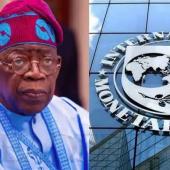According to the latest update from the IMF, published on April 30, 2025, Nigeria is expected to pay SDR22.35 million in charges and interest in 2025.
The most recent data published by the International Monetary Fund (IMF) shows that Nigeria owes a total of SDR125.99 million, representing charges and interest on loans it has drawn.
“SDR” means “Special Drawing Rights” and refers to a form of currency used to value funds borrowed by different beneficiary countries by the IMF.
According to the currency exchange platform XE, each SDR unit was worth N2,180 at the time of this report.
According to the latest update from the IMF, published on April 30, 2025, Nigeria is expected to pay SDR22.35 million in charges and interest in 2025.
For 2026 and 2027, the figure is projected to remain steady at SDR25.91 million. In 2028, the amount rises slightly to SDR25.92 million, before dipping marginally to SDR25.90 million in 2029.
In total, Nigeria’s outstanding charges and interest to the IMF amount to SDR125.99 million. At an exchange rate of N2,180 per Special Drawing Right (SDR), based on XE currency conversion, this translates to approximately N274.66 billion.
Nigeria’s debt to the IMF originates from April 2020, when the country secured a loan approval of SDR2.454 billion.
IMF debt repayments are made up of two components: the principal and associated charges or interest.
Further breakdown shows that Nigeria was not scheduled to begin repaying the principal until 2023, when SDR613.63 million became due. This was followed by a larger repayment of SDR1.227 billion in 2024, and another SDR613.63 million scheduled for 2025.
Before principal repayments commenced, Nigeria paid only charges and interests totalling SDR13.22 million in 2020, SDR25.88 million in 2021, and SDR25.89 million in 2022.
With principal repayments starting in 2023, President Bola Ahmed Tinubu—who assumed office that year—has overseen the ongoing debt servicing.
As of April 30, 2025, IMF data confirms that Nigeria has met its scheduled principal repayments, but still owes SDR125.99 million in charges and interest.
Citing data from the Central Bank of Nigeria’s (CBN) 2024 financial year report, SaharaReporters revealed that the country’s debt burden to the International Monetary Fund (IMF) increased by N2.5 trillion by the end of December 2024, primarily due to foreign exchange losses.
In practical terms, Nigeria’s liability to the IMF stood at N2.5 trillion in 2023. However, the sharp depreciation of the Naira over the course of 2024 caused that figure to double, reaching N5 trillion by year-end.
According to the CBN’s financial statement, this effectively meant that the country had to pay twice as much in local currency to meet its external obligations.
SaharaReporters also pointed out a contradiction between this data and recent claims by government officials, including presidential aides that Nigeria had “cleared” its debts to the IMF. While presidential aides Bayo Onanuga and Dada Olusegun publicly challenged the report—asserting that the IMF debt had been fully repaid—the data tells a more nuanced story.
Although Nigeria may have met its scheduled principal repayments, the IMF still lists charges and interest under “overdue obligations and projected payment funds,” indicating that the country remains indebted in that regard.
SaharaReporters stood by its reporting, emphasising that even if the principal was repaid, the weakened value of the Naira significantly increased the financial burden on Nigeria in local currency terms. As a result, the government had to allocate more public funds than it would have if the Naira had retained its value.
In Nigeria, debt servicing has frequently been blamed for consuming much of the nation’s revenue.
For instance, a SaharaReporters review of Nigeria’s economic report for January 2025 revealed that the country spent N696 billion on debt servicing during that month alone. Between December 2024 and January 2025, the total amount spent on debt servicing reached N1.3 trillion — N696 billion in each of the two months.
This exceeds the budgeted monthly figure of N689 billion for debt servicing.
The review also showed that zero naira was allocated for capital expenditure in January 2025, as stated in the economic report published by the Central Bank of Nigeria.












